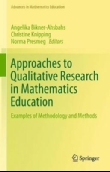Sökning: onr:17310308 > Approaches to Quali...
- 1 av 1
- Föregående post
- Nästa post
- Till träfflistan
Approaches to Qualitative Research in Mathematics Education [Elektronisk resurs] Examples of Methodology and Methods / edited by Angelika Bikner-Ahsbahs, Christine Knipping, Norma Presmeg.
- Bikner-Ahsbahs, Angelika. (redaktör/utgivare)
- Knipping, Christine. (redaktör/utgivare)
- Presmeg, Norma. (redaktör/utgivare)
- SpringerLink (Online service)
- ISBN 9789401791816
- Publicerad: Dordrecht : Springer Netherlands : 2015
- Engelska XV, 592 p. 112 illus., 18 illus. in color.
- Serie: Advances in Mathematics Education, 1869-4918
- E-bok
Innehållsförteckning
Sammanfattning
Ämnesord
Inställningar
Hjälp
Stäng
- Part 1: Grounded theory methodology. Chapter 1: Anne R. Teppo. Grounded Theory Methods. Chapter 2: Maike Vollstedt. To see the wood for the trees: The development of theory from empirical interview data using grounded theory -- Part 2: Approaches to reconstructing argumentation. Chapter 3: Götz Krummheuer. Methods for reconstructing processes of argumentation and Chaptericipation in primary mathematics classroom interaction. Chapter 4: Christine Knipping and David Reid. Reconstructing argumentation structures: A perspective on proving processes in secondary mathematics classroom interactions -- Part 3: Ideal type construction. Chapter 5: Angelika Bikner-Ahsbahs. Empirically grounded building of ideal types. A methodical principle of constructing theory in the interpretive research in mathematics education. Chapter 6: Angelika Bikner-Ahsbahs. How ideal type construction can be achieved: An example -- Part 4: Semiotic research. Chapter 7: Luis Radford and Cristina Sabena. The question of method in a Vygotskian semiotic approach -- Part 5: A theory on abstraction and its methodology. Chapter 8: Tommy Dreyfus, Rina Hershkowitz and Baruch Schwarz. The nested epistemic actions model for Abstraction in Context: Theory as methodological tool and methodological tool as theory -- Part 6: Networking of theories. Chapter 9: Ivy Kidron and Angelika Bikner-Ahsbahs. Advancing research by means of the networking of theories. Chapter 10: Angelika Bikner-Ahsbahs and Ivy Kidron. A cross-methodology for the networking of theories: The general epistemic need (GEN) as a new concept at the boundary of two theories -- Part 7: Multi-level-analysis. Chapter 11: Geoffrey B. Saxe, Kenton de Kirby, Marie Le, Yasmin Sitabkhan, Bona Kang. Understanding learning across lessons in classroom communities: A multi-leveled analytic approach -- Part 8: Mixed Methods. Chapter 12: Udo Kelle and Nils Buchholtz. The combination of qualitative and quantitative research methods in mathematics education—A “Mixed Methods” study on the development of the professional knowledge of teachers -- Part 9: Qualitative Content Analysis. Chapter 13: Philipp Mayring. Qualitative Content Analysis: Theoretical background and procedures. Chapter 14: Björn Schwarz. A study on professional competence of future teacher students as an example of a study using Qualitative Content Analysis -- Part 10: Triangulation and cultural studies. Chapter 15: Ida Ah Chee Mok and David J. Clarke. The contemporary importance of triangulation in a post-positivist world: Examples from the Learner’s Perspective Study -- Part 11: Design research as a research methodology. Chapter 16: Arthur Bakker and Dolly van Eerde. An introduction to design-based research with an example from statistics education. Chapter 17: Michèle Artigue. Perspectives on design research: The case of didactical engineering. Chapter 18: Erin Henrick, Paul Cobb and Kara Jackson. Educational design research to support system-wide instructional improvement. Part 12: Looking back. Chapter 19: Angelika Bikner-Ahsbahs, Christine Knipping and Norma Presmeg. Appendix -- References -- Index of keywords. .
- This volume documents a range of qualitative research approaches emerged within mathematics education over the last three decades, whilst at the same time revealing their underlying methodologies. Continuing the discussion as begun in the two 2003 ZDM issues dedicated to qualitative empirical methods, this book presents astate of the art overview on qualitative research in mathematics education and beyond. The structure of the book allows the reader to use it as an actual guide for the selection of an appropriate methodology, on a basis of both theoretical depth and practical implications. The methods and examples illustrate how different methodologies come to life when applied to a specific question in a specific context. Many of the methodologies described are also applicable outside mathematics education, but the examples provided are chosen so as to situate the approach in a mathematical context.
Ämnesord
- Education. (LCSH)
- Curriculum planning. (LCSH)
- Mathematics. (LCSH)
- Science -- Study and teaching. (LCSH)
- Education.
- Mathematics Education.
- Curriculum Studies.
- Science Education.
Klassifikation
- LC8-6691 (LCC)
- EDU029010 (ämneskategori)
- 370 (DDC)
- E (kssb/8 (machine generated))
Titeln finns på 4 bibliotek.
Bibliotek i Mellansverige (2)
Ange som favorit- Mälardalens universitet, Digitala resurser (Mdhd)Ange som favorit
- Bibliotekets webbplats
-
- Läs hela (Tillgänglig för användare inom Mälardalens högskola) (fulltext) (Springer Humanities, Social Sciences and Law eBooks 2015 English/International)
- Örebro universitetsbibliotek, Digitala resurser (Odig)Ange som favorit
-
- Läs hela (Tillgänglig inom Örebro universitet och externt för studenter och anställda vid universitetet) (fulltext) (Springer Humanities, Social Sciences and Law eBooks 2015)
Bibliotek i Stockholmsregionen (2)
Ange som favorit- Stockholms universitetsbibliotek, Digitala resurser (Hdig)Ange som favorit
-
- Läs hela (Tillgänglig för användare inom Stockholms universitet) (SpringerLink Books Humanities, Social Sciences and Law:Full Text)
- Kungliga Tekniska högskolan, E-resurser (Tdig)Ange som favorit
- Bibliotekets lokala katalog
-
- Läs hela (Online access for KTHB) (fulltext) (Springer)
- 1 av 1
- Föregående post
- Nästa post
- Till träfflistan
Sök vidare
Hjälp
- Fler titlar av
- Bikner-Ahsbahs, Ange ...
- Knipping, Christine.
- Presmeg, Norma.
- SpringerLink (Online ...
- Fler titlar om
- Education.
- Curriculum planning.
- Mathematics.
-
- Science
- Science
- och Study and teaching.
- Serie
- Fler delar
- Printed edition:
- Approaches to Qualit ...
Sök utanför LIBRIS
Hjälp
- Sök vidare i:
- Google Book Search
- Google Scholar
- LibraryThing
Kungliga biblioteket hanterar dina personuppgifter i enlighet med EU:s dataskyddsförordning (2018), GDPR. Läs mer om hur det funkar här.
Så här hanterar KB dina uppgifter vid användning av denna tjänst.
Copyright © LIBRIS - Nationella bibliotekssystem

